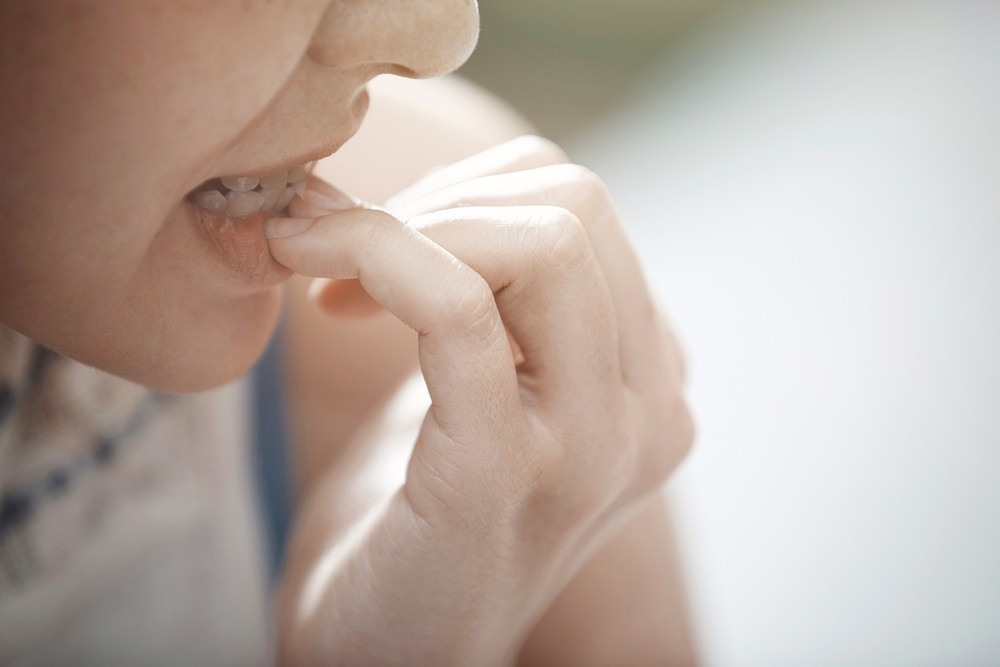Contents
- According to psychologists, what is the root cause of nail biting?
- Other causes of nail biting
- The solution to nail biting
- Why do the majority of perfectionists bite their fingernails?
- Is it true that they strive for perfection?
- Nail-biter characteristics
- If you don’t stop biting your nails, what will happen?

Nail biting is a terrible bad habit. Almost as many women as males engage in this vile practice. However, males are more offended when they witness women engaging in this behavior than when they see men engaging in it. You probably bit your nails at one time in your life, perhaps as a youngster as kids are more likely to do so than adults. The following are some strategies that may help you overcome this habit. Proper nail care with Maby blog.
According to psychologists, what is the root cause of nail biting?
Frequently biting your nails? Why do you justify biting your nails? When asked “Why do people bite their nails so much?” most of us who do it have nothing to say.
For us, onychophagia is merely an annoying habit. However, according to scientific and empirical evidence, there are certain signs that may reveal something about us beyond our poor behaviors.
Did you know that over 20% of all adults regularly bite their nails? To give you an indication of the scale of the problem, consider that millions of Americans engage in this practice.
Fred Penzel, an expert in body-focused repetitive illnesses, says there are a few theories to explain this behavior. Although studies on this practice just started relatively recently, doing so is thought to restore emotional equilibrium.
When we’re bored, chewing our nails can create a sense of stimulation; when we’re anxious, it can help us relax. Recent studies, however, have disproven the hypothesis that worry is at the heart of the matter.
Instead, perfectionism is found to be similar to this behavior, according to a study published in the Journal of Behavior Therapy and Experimental Psychiatry.
Other causes of nail biting
Some scientists have speculated that the evolutionary remnants of the behavior of biting one’s nails may be responsible for its formation. This uses the line of descent from which all animals descended as an example.
Cats, horses, and other species share our tendency to groom excessively, sometimes to the point where we injure ourselves. If you have a cat, you would know. Extreme self-licking by cats might result in hair loss.
Nails are there to be bit, so perhaps that’s the simplest explanation. It’s simple to become addicted to hobbies that reward us repeatedly, as some psychologists have found, and all activities provide some degree of psychological simulation.
While the only tangible benefit of chewing one’s nails is ruined or misshapen fingernails, the act of biting them can provide a peculiar sense of joy nonetheless. To be more precise, the pleasure comes from finally biting off all your nails.
The solution to nail biting
The actions below will assist you in breaking your habit. Just double-check that you’re doing each step properly and keeping at it until you succeed. Let’s ease into this with:
Manicure
Manicures are a must, so schedule them regularly. Why? You won’t be tempted to pick at your nails as much if you take the time to make them look nice. Furthermore, the top coat of nail paint, especially gel polish, is probably not pleasant to the palate. You might be more successful in breaking your bad habit with this simple trick.
Short
Keeping your nails short is the quickest and easiest solution. Because there isn’t much there, you won’t be tempted to bite them, which is good for your nail health. Always have some clippers handy in case you need to trim the stragglers.
Cuticles
You should not allow your cuticles grow unchecked but instead push them back sometimes. You can see more of your nail bed if you push them back. After a shower, while your hands and nails are wet, this task will be much simpler. An easy trick to quit chewing your nails while giving you the confidence boost you need.
Food
Foods high in calcium and magnesium should be consumed. Eating lots of eggs, soy, whole grains, and live will help your nails grow stronger and faster. Foods like tuna, salmon, shellfish, greens, nuts, and seeds are often overlooked. All of the above are necessary for your metabolism, and the last point also helps your nails retain their luster.
Keep active
Discover a means by which you can eliminate your need to constantly pick at your nails.
Some people find that drumming their fingers, fiddling with their pockets, or staring intently at nothing helps them relax. Consider taking up coin collecting if you’re always fiddling with anything tangible. They’re cute and tiny and might be a lot of fun. As long as it’s not dangerous or harmful, though, whatever keeps you occupied is acceptable with me.
Oral cavity
Putting your hands to use is simple, but what is about your mouth? Finding a suitable alternative for this one may be more challenging, but you will succeed eventually. We have a few recommendations for you:
- Use gum
This sweet is perfect for opening the candy bowl, but it may quickly become a major diversion. It’s a great way to distract yourself from nail care and leave with minty fresh breath.
- Snacks
It’s a good idea to have a few small meals throughout the day. Crunchy foods, such as carrots, chips, celery, or anything else, may help stop people from chewing their nails.
Nibble inhibitor
If you find yourself nibbling your nails frequently, try painting a nibble inhibitor on them. You may get them at any major supermarket, grocery store, or drugstore. The flavor of these inhibitors’ harmless compounds is quite repulsive. It’s the same process as painting nails with ordinary nail polish. Biting one’s nails becomes an unpleasant chore when accompanied by that foul taste. If you’re really anxious about giving in to temptation, you can use it multiple times.
Fake nails
A good way to hide your imperfect natural nails is to wear fake ones. Invest in a professional manicure; choose acrylics or tips for your nails. A month is plenty of time to use them properly once you have them. When you take them off, you’ll see the growth of your natural nails. In addition, invest in some lovely fake nails so that you won’t be tempted to mess up your hard work.
One by one
Stop chewing your nails for a few days and see how you feel. We must all begin in the beginning, but practice makes perfect, right?
If you think this would be too much of a challenge, you may always use an adhesive bandage to protect your nail. Doing so should prevent you from reaching the nail, making biting it more of a challenge.
The dressings
Bandages should be worn daily until nail biting is no longer a problem. If the bandage becomes wet or soiled, or if it has been in place for more than a few days, replace it with a new one.
Only take them off when you’re going to bed or before a major event. To break a habit, give yourself at least 20 days. Keep going until you reach this point, and you should be fine. After making some progress, you’ll find that everything goes much more quickly and easily.
The flip of a switch
Nail biting is a habit that can be difficult to break without major lifestyle adjustments. If you can’t wait till the 20 days are up, then you’re missing out on some great new experiences.
Consider replacing your regular gum with sugar-free variety for a change of pace. The stress balls, have you heard of them? When temptation strikes, just grab one and give it a good squeeze. You need to replace your negative behavior with something pleasant and agnostic.
Why do the majority of perfectionists bite their fingernails?
Perfectionists may be more prone to nail biting for a number of reasons. For the reasons stated above, perfectionists can become bitter and unhappy with themselves. Because they strive for perfection in every aspect of their lives, perfectionists have a hard time unwinding and getting things done at a reasonable pace.
Frustration sets in when they realize they are unable to complete a task by the deadline they have set for themselves.
Nail biting provides them with the mental reassurance that they are truly doing something, rather than just sitting there idly.
Is it true that they strive for perfection?
To begin, it does appear that people who suffer from obsessive-compulsive disorder are more likely to be compulsive nail biters. According to the aforementioned research, nail biters tend to be type A personalities that are meticulous and well-organized.
They’ve found that this practice has helped them feel less annoyed by their tendency toward perfectionism. These perfectionists may find brief relief in their nail-biting behaviors, which might help them keep their perfectionism in check.
Almost immediately following the euphoria and tranquility, perfectionists may experience pain and maybe even humiliation.
Nail-biter characteristics
Naturally, nail-biting might be linked to various other personality traits besides the obvious perfectionist one. Let’s talk about what being a perfectionist says about your character.
Biting your nails is a repetitive behavior, and those who do it regularly are more likely to feel irritated. You are more easily bored than other people and constantly planning what comes next.
If you don’t stop biting your nails, what will happen?
The consequences of continuing to bite your nails are listed below.
Nail biting is bad for your nails and nail bed health first and foremost. Splits and infections in the cuticle are inevitable consequences. Nail biting has obvious cosmetic consequences, but it can also lead to serious health issues if not handled early on.
Biting your nails enables the bacteria and germs on the bottom of your nails to enter your body through your mouth, which can be very dangerous to your health. Nail biters are more likely to develop infections of the nails, including fungal infections, warts, and swelling and redness.
Biting your nails can also lead to tooth misalignment and the costly and time-consuming process of having your teeth realigned professionally. Nail biting can lead to gastrointestinal issues due to the ingestion of potentially pathogenic germs.
There will be noticeable differences if you’ve completed at least half of the tasks on our list. If you find yourself biting your nails again, however, you should reapply the adhesive bandages for a longer amount of time.
It takes as long as three months to break these routines for some people. Try both and see which one gives you the greatest results with your nails. In time, your nail quality will improve. The only unknowns are how long you’ll have to wait and how strong your resolve is. It depends on your frame of mind.
Nail biting, fortunately, is not a very risky pastime. Your hands are probably full of germs, so you’re still putting yourself at risk when it comes to hygiene and diseases.
Biting too closely to the nail beds also leaves an open invitation for the next opportunistic pathogen to enter the area and cause infection. If you bite your nails on purpose, you may want to reconsider. Also you can refer to: is it unhealthy to bite your fingernails?
